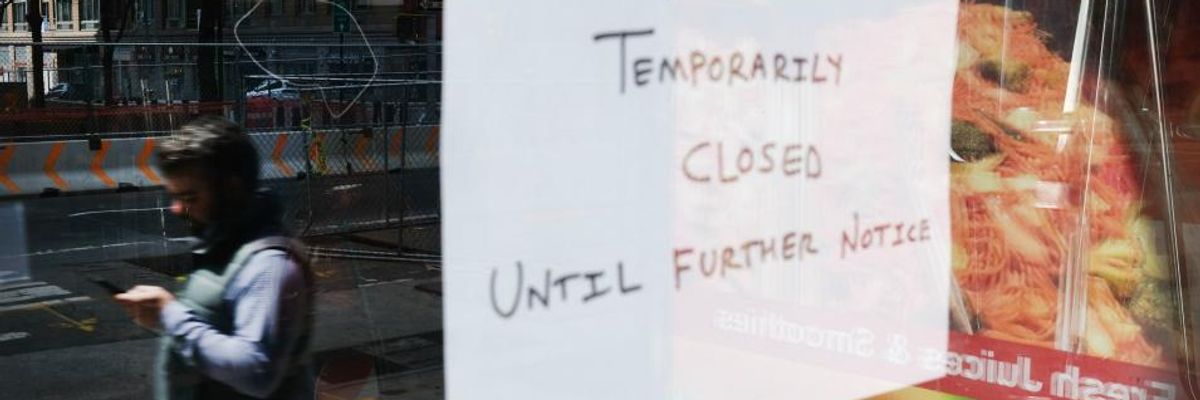After U.S. Treasury Secretary Steven Mnuchin said on CNN's "State of the Union" Sunday that a deal with congressional leadership to provide more relief to small businesses impacted by the ongoing coronavirus pandemic could be finalized as early as the end of the day, some progressives highlighted what's been left out of the emerging aid package and urged Democratic lawmakers to keep fighting to expand it.
"I think we're very close to a deal today. I'm hopeful that we can get that done," Mnuchin toldCNN's Jake Tapper. "I'm hopeful that we can reach an agreement that the Senate can pass this tomorrow, and that the House can take it up on Tuesday. Wednesday, we would be back up and running."
Mnuchin said the deal would allocate $300 billion more to the Paycheck Protection Program (PPP). While the Coronavirus Aid, Relief, and Economic Security (CARES) Act that President Donald Trump signed last month had earmarked $349 billion for the program, the U.S. Small Business Administration (SBA) revealed Thursday that "all PPP funds are exhausted."
Despite conflicting estimates from other experts, Mnuchin said another $300 billion for the PPP "should be sufficient to reach almost everybody." The SBA is currently not accepting new applications for the PPP or Economic Injury Disaster Loans (EIDL). The new package would include $50 billion for the EIDL program, $75 billion for hospitals, and $25 billion for COVID-19 testing, according to Mnuchin.
As Erica Werner and Jeff Stein reported for the Washington Post:
The new money for hospitals in the agreement would come on top of $100 billion in the original $2 trillion rescue bill. Hospitals have been begging for additional relief, with some overwhelmed by treating COVID-19 patients and others losing nearly all revenue and laying people off because they are no longer doing elective procedures.
Democrats had also been demanding an additional $150 billion for cities and states whose budgets have been decimated by the economic toll of the coronavirus. But Republicans have opposed that, insisting it was not the federal government's job to make up for state budget shortfalls.
The Post and CNN reported that according to unnamed Senate GOP leadership aide, during a call about the package Sunday afternoon Mnuchin and Senate Majority Leader Mitch McConnell (R-Ky.) touted the extra PPP funding while reiterating that provisions sought by Democrats won't be in the package.
Senate Minority Leader Chuck Schumer (D-N.Y.), who also appeared on CNN Sunday, said that Democrats were still pushing "hard" for more local funding as well as hazard pay for frontline workers. "It is so important," he said. "We don't want our police, our firefighters, our EMTs, our bus drivers--this is not an abstract issue--we don't want them fired. They're as important as anybody else."
Schumer added the "we've made very good progress" on the package negotiations and he anticipated that a deal could be reached by Sunday night or Monday morning. House Speaker Nancy Pelosi (D-Calif.) struck a similar chord on ABC's "The Week" Sunday morning, saying, "I think we're very close to agreement."
While the top two Democrats in Congress seemed optimistic Sunday, the television show appearances and reporting sparked calls for further relief.
Responding to a breakdown of the package by Post reporter Stein on Twitter, healthcare advocate Ady Barkan sent a public message to Pelosi: "This is not nearly good enough. You have enormous leverage, and the American people are in dire need of relief. Use your power."
Ilya Sheyman, former executive director of MoveOn Political Action, took aim at Pelosi, Schumer, and the entire Democratic Party:
Not including money for a rent freeze during the pandemic--a policy that's popular even among registered Republican voters, according to recent polling--"is terrible and cruel," tweeted the group People for Bernie. "People can't pay the rent."
As Common Dreams reported Thursday, roughly 22 million people have filed for unemployment benefits since mid-March--and for many workers in the United States, losing a job also means losing health insurance. In response to the latest jobless claims, Heidi Shierholz of the Economic Policy Institute urged Congress to "provide aid to state and local governments, extend unemployment insurance benefits, provide better protections for workers and jobs, and include funding to safeguard our democracy."
The package that Mnuchin and Democratic leaders were discussing Sunday "is totally inadequate," said Jonathan Ladd, an associate professor at Georgetown University's McCourt School of Public Policy. "Not aiding state governments will make the economic contraction much worse. And this doesn't even fully fund the small business loan program!"
Jordan Weissmann, who writes about economics and public policy for Slate, warned that without money for cities and states, "we're going to face a repeat of '09-'13, where state-level austerity contributes to a lingering depression."
Richard Yeselson, a contributing editor at Dissent, also expressed concerns about the consequences of no funding for local governments:
"The 'concessions' Democrats won--money for hospitals and for testing--are totally uncontroversial things that Republicans are fine with. Other than that, Democrats got nothing, if this is the final deal," tweetedThe Intercept's Ryan Grim, linking to the Post reporting. In a follow-up tweet, he added: "Ok fine you win we will test people showing COVID symptoms. But only because you drove such a hard bargain!"

